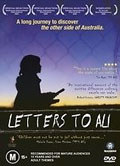
Directed by
Clara Law
106 minutes
Rated M
Reviewed by
Bernard Hemingway

Letters To Ali
Synopsis: In 2002 Clara Law read Trish Kerbi's account in The Age newspaper of her correspondence with a young teenager being held at the Baxter detention centre in Port Hedland. Law contacted Kerbi with the view to making a film about her experience. This is the result.It is somewhat of a misnomer to call Clara Law's latest film a documentary. It is more a work of art. Documentaries imply facts and figures, talking heads and archival footage. There are aspects of these here but in the main the film is a collage of Law's preoccupations - her empathy with Trish Kerbi, whose monumental efforts to care for one detainee are a model of individual action, her closeness to the immigrant (let us call Ali that for the time being) experience, and her sense of wonder for her adopted land. Ali, the nom de guerre of the young Afghan refugee who Kerbi tries to shepherd through the detainee experience, is an indistinct figure. Without family or friends on "the outside", hidden behind steel pikes and razor wire, Law has no access to him other than through the Kerbi's verbal accounts of meeting him. When he does finally emerge towards the end of the film, presumably for legal reasons, there are no interviews and all we ever see is a digitally-hazed smudge as he larks around with the Kerbi children.
Law is no Michael Moore and, despite well-meaning utterances to the contrary, her film is probably too eclectic and subjective to win converts to the refugees' cause. One can safely predict that few of Prime Minister John Howard's constituency will be amongst its audience.
Letters To Ali is effectively a pictorial diary of the journey of discovery occasioned by Law's chance reading of a newspaper article. In this respect it is worth studying. We can see it as her own letter to Ali, that name, not coincidentally, standing for the paradigmatic Arab, something which one day when the detention centres are rusting hulks in the desert he will be able to look at and reflect on what he lost and gained when his father decided that he had to get his son out of reach of the Taliban.
The film is also an intriguing document for all Australians who like Law, live in eastern seaboard middle class suburbia and never encounter our country's vastness. For me the most effective moment was when the Kerbis pass through an Aboriginal settlement on their way to Port Headland. Apparently not stopping, all we see are derelict buildings, the shells of abandoned cars littering the landscape and a blur of figures in conversation. It is a reminder that we are all illegal immigrants, that unlike the inmates of Howard's camps, when we came by boats we took the land by force and in the name of laws we made ourselves and that ever since then we have through ignorance done little but abuse it and its original inhabitants. As Law makes very evident, that we now invoke these same laws to exclude a 15 year old homeless boy is the height of shameful arrogance.

Want more about this film?


Want something different?




